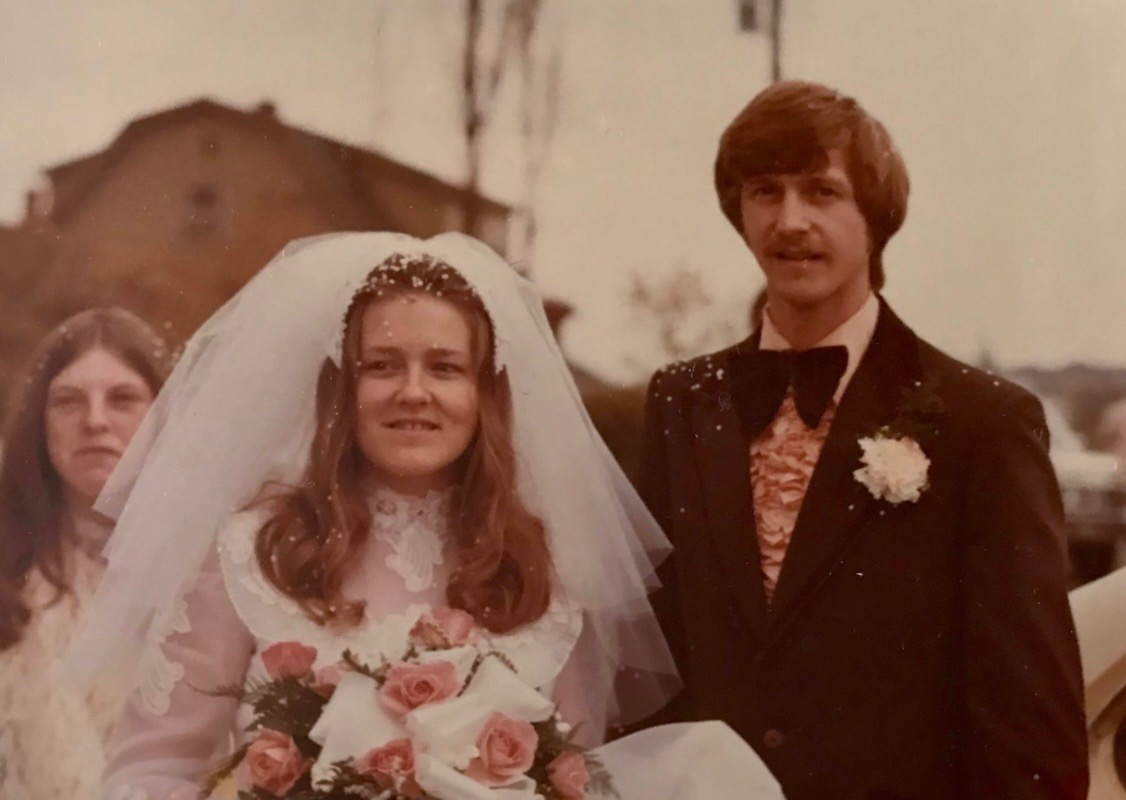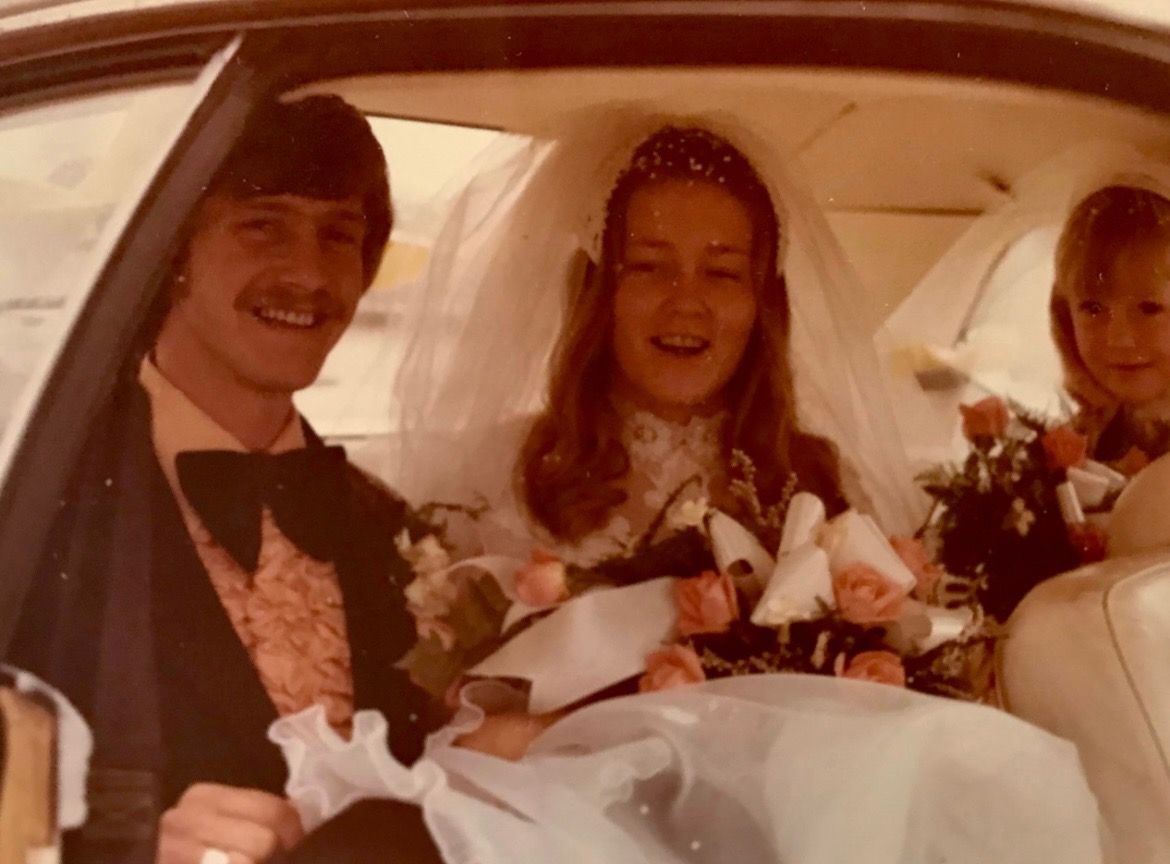In sickness and in health

caption
Susan and Robert French have lived in Back Bay, NB, all their lives.One couple’s life inside the challenging, delicate world of dementia
Fighting back isn’t an option, so he just stands there and takes it. Sporadic punches are a part of Robert French’s day-to-day life. It will pass in a minute, and his wife Susan will forget having hit her husband. When she finally eases up, she goes to the sofa to lie down, as if it never happened. The task of getting her dressed for the day having failed, he goes to the kitchen to make her a toaster strudel for breakfast.
Escaping to the kitchen gives him a break to recall good memories over the past forty-six years. This is how he gathers the strength to give her unconditional love and care, even though she cannot do the same for him anymore. He doesn’t see the warmth and gentleness he used to find in Susan’s eyes. Now, especially during one of her aggressive episodes, her eyes appear hollow, as if she’s alienated from the rest of the world.
Robert says that for five years he and Susan have been facing one of the world’s greatest evils. Dementia.
Dementia
“You know how to do it, Susan,” Robert says. “Just like this.”
He guides the pen across the Christmas card that she is attempting to sign. They are sitting at the wooden dining table where they always sign their cards, the table they bought together thirty-five years ago at a little furniture store in Pennfield, New Brunswick. Christmas is a month away but, excited by the holiday, they always sign cards and wrap gifts early. Impatient, he showed Susan how to write her name, insisting she could still do it. But when it was her turn, the pen stopped, and a confused look grew on her face.
“I don’t, Robert. I don’t.”
At that moment, for the first time, Robert acknowledged that his wife was sick. There had been small signs before, such as leaving her purse in the grocery store and forgetting how to use the pedal and brake. He ignored these signs and, for almost a year, told himself this couldn’t be happening. Susan took care of her mother when she’d had dementia in the ’90s and had feared the disease ever since. His heart broke to think that her worst fear had come true.
Susan always viewed the disease as an inevitable part of aging, convinced she had the gene that can pass on dementia. (The Alzheimer’s Society says dementia is hereditary in only a small number of cases.) When she began to make mistakes or forgot how to do something, she would say “I’m sorry”, or ask, “is there something wrong with me?” Like Susan, 730,000 other Canadians are affected by dementia. The number of Canadians 65 and older is increasing, and so is the number of people living with dementia.
Robert was the last one in his family to accept her illness. Their two children, Jordan and Serena, first noticed a change in their mom in early 2019. When Serena tried to bring it up Robert ignored her, and Susan would say, “there’s nothing wrong with me.” One day, Serena worked up the courage for a much-needed talk with her dad. She sat on the living room couch in her parents’ house and asked Robert to sit with her.
“Dad, you must be noticing what’s wrong with Mom,” Serena said. “We want her to be around for a long time, and if we act now there’s medicine we can give her to help.”
She cried throughout the entire conversation. She wanted so badly to be heard, and this was something her dad didn’t want to hear. His bottom lip started to quiver.
Robert
Robert has lived in Back Bay, a small village about 70 km. west of Saint John, New Brunswick, his whole life. Just down the road from the house he lives in now is a two-storey house with white siding and a new metal roof. This is the home that Robert grew up in. It’s in the middle of the Back Bay Loop, where you can see the fishermen’s wharf and smell the strong salty water. The house has been renovated over the years, and doesn’t look quite the same since it was sold out of the family twenty years ago. When Robert was a young boy, there used to be a little shed near the house for animals. His father always kept pigs and cows for the family to eat, and occasionally brought seafood home from the boat he fished on. Robert would pack lobster sandwiches for lunch to bring to school. Shredded lobster meat mixed with mayo, between two slices of white bread.
Robert is the youngest of nine siblings, but he didn’t get to know three of them because they died as infants. He enjoyed growing up constantly surrounded by people. Back Bay is one of those close-knit communities where everyone knows everyone. People stop by unannounced for a chit-chat or to drop off a bag of clams they dug up the other day. Robert found comfort in this; he never liked to be alone. He grew up here, and he wants to die here. He says, “it will always be home.”

caption
Susan and Robert French on their wedding day, October 22, 1977.He likes to compare himself to a cat with nine lives. Growing up, he was reckless. He’s been run over by a car, a boat, fallen off a boat, and the list goes on. One night when he was fifteen, he was at the beach on the cusp of sunset. While wading in shallow water to rinse sand off his pants, a boat ran pulled into shore and ran him over, tearing open his back and puncturing a lung. When the recklessness faded he decided to settle down and start working.
There’s a convenience that comes with being a fisherman living close to the water with a big wharf to dock your boat. Many people in Back Bay make this their career, and there’s good money in it. In 1977, the year he married Susan, Robert bought a forty-foot red and white wooden boat, and started fishing for lobster and scallops.
Fishing gave meaning to Robert’s life – after his other loves, Susan, and God of course. He puts God at the head of those three loves. “I don’t know how people make it through things without the Lord,” he says.
Being a Christian has got him through life’s challenges; he simply gives his problems to God. He sits on the deacon board at his church and occasionally leads the congregation in song before the preacher gives the sermon. He finds time to read the Bible every day on the Holy Bible app. He doesn’t normally use apps, so is quite proud that he figured out how to download it. Getting to Sunday services is nearly impossible now because of Susan. She couldn’t sit through an entire service, and can’t be left at home, so he continues to pray and listen to sermons online. With Susan sick, Robert needs God more than ever.
Family comes first
Robert knew he wanted Susan the moment they met, but she wasn’t attracted to him at first. When she finally caved, they married six months later. Family and friends assumed they married quickly to cover up a pregnancy, but the couple waited two years to have their first child. “That’s the longest pregnancy I’ve ever seen,” Robert has joked to family and friends over the years.
October 22, 1977, was the best day of his life. It was the day he married his best friend. They invited 150 loved ones to gather in a tiny church on Back Bay Loop Road; one of those churches with old wooden pews and a hymn book at every seat. The church would be torn down just seven years after their wedding.
They knelt in prayer at the beginning of the ceremony, asking God to guide them in their marriage and keep it strong. They then exchanged their wedding vows. The pastor read, “Will you love her, comfort, honour her, and keep her, in sickness and in health?” Standing there, young and eager, Robert replied, “I do.” He felt high on love, not giving much thought to the idea of sickness – though he knew that he loved her enough to always take care of her. Less than fifty years later, they are living out the solemn part of their vows.
Susan was a giver. She would offer everything she owned to those how needed it more than her. When friends stopped by, she would open the fridge and start listing off the food she could feed them.
The couple did everything together. Even tasks like cleaning the dishes were never done alone. He would wash, she would dry. They did this together not because the task required four hands, but because it was more enjoyable that way.
“We were each other’s best friends. We had other friends, but we would rather hang out together,” Robert says. “Family always comes first.”
In 2019, when Susan’s dementia worsened, Robert decided to quit his job. The decision to leave fishing was risky, because it was his only source of income. He was 62 years old and not ready to retire; nor had he saved up for retirement. But being with Susan every day was the only way he could ensure she got proper care. He believed that his care is the best care, so nursing homes were not an option.
Dementia has made them even more inseparable than they used to be. Susan panics when she’s not with Robert and yells his name continuously until she finds him. His name is the only word she can still speak clearly; the rest sound like squeals and mumbles. He likes to be near her when she needs him, and is secure in his decision to be a full-time caretaker.
Stay-at-home husband
Robert sits on his designated side of their worn-out leather couch with a bottle of Pepsi in hand, watching the Maple Leafs play the Jets at full volume. To his right, Susan is deep into her evening nap, legs propped up on his lap. He never misses a game, partly because the Leafs are his lifelong favourite team, and partly because he spends most of his time in front of the TV. Before the game, he spent the day getting dirty jobs out of the way. She has uncontrollable accidents in the middle of the night, and sometimes the adult diaper isn’t enough to contain it. He often has a mess to clean in the morning, and their bed sheets are fading in colour from how often they go in the laundry. While trying to confine her to the tiny bathroom shower, he strapped a new diaper on his wife.
“If only I had a third arm,” Robert tells himself, “I’d be all set.”
During the game the house smells like Thanksgiving dinner, thanks to the mashed potatoes he made today. Susan is a super picky eater, except when it comes to potatoes. She won’t eat most of the foods she used to like, almost as if dementia removed some of her new taste buds. And she has a new desire to eat foods with her fingers, like a toddler.
“What would you like for eat?” he will ask at meal times. He doesn’t expect a response, but asking these questions keeps their relationship feeling normal. He fries meat and steams veggies to go with it, then cuts the meat into tiny pieces, so she doesn’t choke. If she sees him take her pills from the wooden cupboard above the sink, she starts to get antsy. She will spit them out instead of swallowing.
The Leafs win 4-2. He carefully slides her legs off him, trying not to wake her, and mutes the TV. The only free time he has is when she’s napping, so he uses this time to step outside and clean the snow off their front porch. For a 68-year-old guy, he’s in good shape. Shovelling snow and lifting his wife out of bed aren’t difficult for him yet. For this, he is thankful.
He reaches for his grey loafers and ball cap that says Florida across the front, and puts on a black winter jacket. His daughter buys him winter gloves almost every Christmas and birthday, knowing that he will probably forget to put them on. As he starts to shovel the snow, the gloves stay just inside the house.

caption
Susan and Robert French on their wedding day, October 22, 1977.Their home is where Susan is most comfortable; leaving the house often gives her anxiety or results in a meltdown. When Robert isn’t in her sight, the meltdown is worse. Robert resists his urge to get out of the house or visit others, which he can’t do much anymore. This is hard for him, given he thrives on the presence of friends and family.
They now have to come to him, but often don’t want to, because people are unsure how to act around Susan. The peak of his social life is check-ins from three of Susan’s eight sisters, Ruby, Karen, and Mona. They each live a few minutes down the road, so Robert often calls them to help with Susan. Also a big help is their daughter Serena, who visits once a week to shower her mother and keep her occupied while Robert sneaks into town to get a few groceries.
Robert heads back inside, bringing a bit of snow in with him from his loafers. Susan is frantically yelling his name. “Robert! Robert!” He peeks in the living room to see if Susan is still there. Her voice is coming from their bedroom, where she usually scurries when she feels lost or can’t locate her husband. Still dragging snow through the house, Robert rushes to reassure her that he is here.
She took care of him for almost fifty years, he says. Now, it’s his turn.
Editor's Note
This article first in appeared in the Halifax Chronicle-Herald on March 9, 2024. This story won the silver medal for feature writing/academic in the 2024 Canadian Online Publishing Awards.
About the author
Chloe Hannan
Chloe Hannan will soon graduate with a Bachelor of Journalism Honours degree from the University of King’s College.
